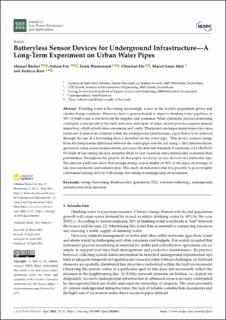Please use this identifier to cite or link to this item:
https://doi.org/10.21256/zhaw-27852Full metadata record
| DC Field | Value | Language |
|---|---|---|
| dc.contributor.author | Böbel, Manuel | - |
| dc.contributor.author | Frei, Fabian | - |
| dc.contributor.author | Blumensaat, Frank | - |
| dc.contributor.author | Ebi, Christian | - |
| dc.contributor.author | Meli, Marcel Louis | - |
| dc.contributor.author | Rüst, Andreas | - |
| dc.date.accessioned | 2023-05-17T09:13:49Z | - |
| dc.date.available | 2023-05-17T09:13:49Z | - |
| dc.date.issued | 2023-04-29 | - |
| dc.identifier.issn | 2079-9268 | de_CH |
| dc.identifier.uri | https://digitalcollection.zhaw.ch/handle/11475/27852 | - |
| dc.description.abstract | Drinking water is becoming increasingly scarce as the world’s population grows and climate change continues. However, there is great potential to improve drinking water pipelines, as 30% of fresh water is lost between the supplier and consumer. While systematic process monitoring could play a crucial role in the early detection and repair of leaks, current practice requires manual inspection, which is both time-consuming and costly. This project envisages maintenance-free measurements at numerous locations within the underground infrastructure, a goal that is to be achieved through the use of a harvesting device mounted on the water pipe. This device extracts energy from the temperature difference between the water pipe and the soil using a TEG (thermoelectric generator), takes sensor measurements, processes the data and transmits it wirelessly via LoRaWAN. We built 16 harvesting devices, installed them in four locations and continuously evaluated their performance throughout the project. In this paper, we focus on two devices of a particular type. The data for a full year show that enough energy was available on 94% of the days, on average, to take measurements and transmit data. This study demonstrates that it is possible to power highly constrained sensing devices with energy harvesting in underground environments. | de_CH |
| dc.language.iso | en | de_CH |
| dc.publisher | MDPI | de_CH |
| dc.relation.ispartof | Journal of Low Power Electronics and Applications | de_CH |
| dc.rights | https://creativecommons.org/licenses/by/4.0/ | de_CH |
| dc.subject | Energy harvesting | de_CH |
| dc.subject | Thermoelectric generator | de_CH |
| dc.subject | TEG | de_CH |
| dc.subject | Wireless technology | de_CH |
| dc.subject | Underground infrastructure | de_CH |
| dc.subject | Leak detection | de_CH |
| dc.subject.ddc | 621.04: Energietechnik | de_CH |
| dc.title | Batteryless sensor devices for underground infrastructure : a long-term experiment on urban water pipes | de_CH |
| dc.type | Beitrag in wissenschaftlicher Zeitschrift | de_CH |
| dcterms.type | Text | de_CH |
| zhaw.departement | School of Engineering | de_CH |
| zhaw.organisationalunit | Institute of Embedded Systems (InES) | de_CH |
| dc.identifier.doi | 10.3390/jlpea13020031 | de_CH |
| dc.identifier.doi | 10.21256/zhaw-27852 | - |
| zhaw.funding.eu | No | de_CH |
| zhaw.issue | 2 | de_CH |
| zhaw.originated.zhaw | Yes | de_CH |
| zhaw.pages.start | 31 | de_CH |
| zhaw.publication.status | publishedVersion | de_CH |
| zhaw.volume | 13 | de_CH |
| zhaw.publication.review | Peer review (Publikation) | de_CH |
| zhaw.funding.zhaw | Smart Water Pipes | de_CH |
| zhaw.author.additional | No | de_CH |
| zhaw.display.portrait | Yes | de_CH |
| Appears in collections: | Publikationen School of Engineering | |
Files in This Item:
| File | Description | Size | Format | |
|---|---|---|---|---|
| 2023_Boebel-etal_Batteryless-sensor-devices-for-underground-nfrastructure_jlpea.pdf | 26.88 MB | Adobe PDF |  View/Open |
Show simple item record
Böbel, M., Frei, F., Blumensaat, F., Ebi, C., Meli, M. L., & Rüst, A. (2023). Batteryless sensor devices for underground infrastructure : a long-term experiment on urban water pipes. Journal of Low Power Electronics and Applications, 13(2), 31. https://doi.org/10.3390/jlpea13020031
Böbel, M. et al. (2023) ‘Batteryless sensor devices for underground infrastructure : a long-term experiment on urban water pipes’, Journal of Low Power Electronics and Applications, 13(2), p. 31. Available at: https://doi.org/10.3390/jlpea13020031.
M. Böbel, F. Frei, F. Blumensaat, C. Ebi, M. L. Meli, and A. Rüst, “Batteryless sensor devices for underground infrastructure : a long-term experiment on urban water pipes,” Journal of Low Power Electronics and Applications, vol. 13, no. 2, p. 31, Apr. 2023, doi: 10.3390/jlpea13020031.
BÖBEL, Manuel, Fabian FREI, Frank BLUMENSAAT, Christian EBI, Marcel Louis MELI und Andreas RÜST, 2023. Batteryless sensor devices for underground infrastructure : a long-term experiment on urban water pipes. Journal of Low Power Electronics and Applications. 29 April 2023. Bd. 13, Nr. 2, S. 31. DOI 10.3390/jlpea13020031
Böbel, Manuel, Fabian Frei, Frank Blumensaat, Christian Ebi, Marcel Louis Meli, and Andreas Rüst. 2023. “Batteryless Sensor Devices for Underground Infrastructure : A Long-Term Experiment on Urban Water Pipes.” Journal of Low Power Electronics and Applications 13 (2): 31. https://doi.org/10.3390/jlpea13020031.
Böbel, Manuel, et al. “Batteryless Sensor Devices for Underground Infrastructure : A Long-Term Experiment on Urban Water Pipes.” Journal of Low Power Electronics and Applications, vol. 13, no. 2, Apr. 2023, p. 31, https://doi.org/10.3390/jlpea13020031.
Items in DSpace are protected by copyright, with all rights reserved, unless otherwise indicated.